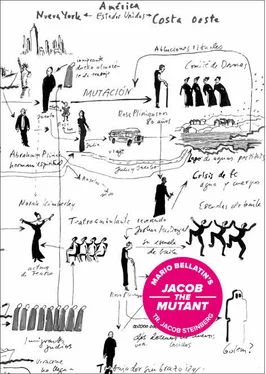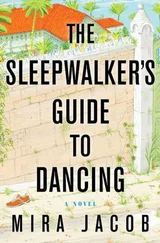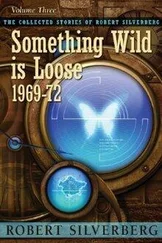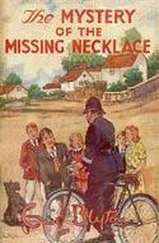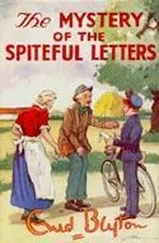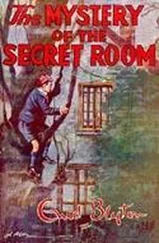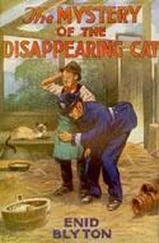Mario Bellatin - Jacob the Mutant
Здесь есть возможность читать онлайн «Mario Bellatin - Jacob the Mutant» весь текст электронной книги совершенно бесплатно (целиком полную версию без сокращений). В некоторых случаях можно слушать аудио, скачать через торрент в формате fb2 и присутствует краткое содержание. Год выпуска: 2015, Издательство: Phoneme Media, Жанр: Современная проза, на английском языке. Описание произведения, (предисловие) а так же отзывы посетителей доступны на портале библиотеки ЛибКат.
- Название:Jacob the Mutant
- Автор:
- Издательство:Phoneme Media
- Жанр:
- Год:2015
- ISBN:нет данных
- Рейтинг книги:3 / 5. Голосов: 1
-
Избранное:Добавить в избранное
- Отзывы:
-
Ваша оценка:
- 60
- 1
- 2
- 3
- 4
- 5
Jacob the Mutant: краткое содержание, описание и аннотация
Предлагаем к чтению аннотацию, описание, краткое содержание или предисловие (зависит от того, что написал сам автор книги «Jacob the Mutant»). Если вы не нашли необходимую информацию о книге — напишите в комментариях, мы постараемся отыскать её.
is a novella in a perpetual state of transformation — a story about a man named Jacob, an ersatz rabbi and owner of a roadside tavern. But when reality shifts, so does Jacob, mutating into another person entirely.
Jacob the Mutant — читать онлайн бесплатно полную книгу (весь текст) целиком
Ниже представлен текст книги, разбитый по страницам. Система сохранения места последней прочитанной страницы, позволяет с удобством читать онлайн бесплатно книгу «Jacob the Mutant», без необходимости каждый раз заново искать на чём Вы остановились. Поставьте закладку, и сможете в любой момент перейти на страницу, на которой закончили чтение.
Интервал:
Закладка:
It begins by confirming that it is a work that was never published during its author’s lifetime.
For a variety of reasons, it was kept hidden until the time when certain retired employees of two German publishing houses admitted to having saved fragments of the text in their archives.
The Border .
Mario Bellatin gives these fragments the name Jacob the Mutant , and he selects those fragments in which Joseph Roth narrates the years of the tavern known as The Border, as well those spent in an American village.
Mario Bellatin himself has affirmed on more than one occasion that the material left by Joseph Roth is quite extensive and chaotic.
For example, in the book Jacob the Mutant , the Tiny Nocturnal Zoo is never mentioned.
The Tiny Nocturnal Zoo is a place similar to the one that my grandfather and I traversed on certain days of the week.
In my grandfather’s zoo, in addition to the camels, there was a pool where some seals were being raised.
In the birdhouse for birds of prey something terrible would happen.
Because it was an establishment of meager means, some of the employees would be given orders to place cages in nearby trees, so as to trap small wild birds that would then be placed live in the same enclosures as the birds of prey, as food for them.
The Tiny Nocturnal Zoo was located next door to Rabbi Jacob’s house.
On more than one occasion, Mario Bellatin affirmed that he found it fascinating to imagine a scene, in the early hours of the day, of a humble rabbi welcoming a set of children from a Central European village as his wife returned home after having run the tavern that they had set up in what had previously been, for several generations, the barn on the property where they lived.
The children were received in the main area of the small house. Around a large wooden table that Jacob and his wife used to eat.
It wasn’t common in those days (nor do I think it is today) for rabbis to behave in such a way.
Not only was it unusual to receive children in their house instead of a classroom built outside of the home, but it was also strange that his wife would dedicate her time to managing an establishment of that nature.
That she would do it at improper hours, as well.
That the wife of a rabbi had to face a series of drunken men wasn’t common within the tradition.
This is why the woman in reality managed a collection of trained wild animals — a nocturnal zoo, of sorts — which was the way the couple had found to carry out such an activity within the norms of their religion.
In that corner of the Austro-Hungarian Empire lay the rabbi’s small house and the tavern — a nocturnal zoo — out back.
Even though it didn’t have an established name, the establishment was known as The Border to the people who frequented it.
They were not easy times and, a few kilometers away — perhaps two or three — lay the Empire’s outer limits.
It was a confusing region. In addition to the economic difficulties that had become a part of day-to-day life (which were the reason the barn had to stop being used for its original purpose and become a small zoo whose visitors could drink huge amounts of alcohol surrounded by caged wild animals), in neighboring Russia the pogroms that had devastated the region for several centuries had intensified, or — better put — come back.
The changes in the political situation in Russia appeared to have revived the systematic practice of the elimination of entire Jewish communities.
The news of villages laid waste by revolutionary forces had even reached the place where the Tiny Nocturnal Zoo was located.
The community members would get together in the rabbi’s house to hear the stories brought by some of the survivors of that holocaust.
Around Jacob’s table the sad tales were told, almost inevitably ending in a synagogue ablaze and the faithful trapped within.
Jacob always advised his visitors to continue their flight.
To take refuge as quickly as possible far from those lands.
Jacob knew that at a given moment not so far into the future the same occurrences would also come to the village they lived in, reason for which he took advantage of these reunions to remind his community members that they ought to perpetually be prepared for a diaspora.
Not only did the dispersion that his community members would suffer and the future of the children he was educating worry Jacob, but also the future of the Tiny Nocturnal Zoo that had cost him many years and much effort to build.
The Tiny Nocturnal Zoo was built little by little.
As is known, Jacob and his family lived in a region of continuous transit.
It was not uncommon that hunters from the north would cross the town, carrying with them the young of the wild animals they had killed for their furs.
Small wolf cubs, bears of various sizes, and small lion or tiger cubs were among the animals brought by those foreigners on their way through the region.
Gradually the barn became the place where Jacob himself built a series of cages to raise the animals he went about acquiring or trading for food items.
He liked to brag about a panther that as a cub had cost him the equivalent of twenty kilograms of recently harvested oats.
It was curious how, despite the fact that Jacob’s words seemed as if they were filled with the logic of the obvious, many of his community members couldn’t believe that at any point in time they would no longer belong to the land that had been theirs for several generations.
Jacob tried to be subtle while expressing his statements.
He understood that many of them, himself included, didn’t have a thorough understanding of the world.
That is why he was extremely cautious when, upon finishing a cage, he would tell his followers: go forth and walk and try not to think.
Nonetheless, he urged those who came fleeing to continue their routes and not to stop until they reached some point on the other side of the ocean.
In the meantime, he managed to arrange — under the pretext of his visits to the Tiny Nocturnal Zoo — for his wife to carry forward the administration of the tavern while Jacob took on the responsibility of teaching the community children by day and caring for the animals, keeping them in the best conditions possible.
It was difficult for some to know what motive Jacob really had for keeping a tavern in operation.
Some could have thought that it had to do with a means of making money, but few understood that the real reason behind such an establishment was helping the numerous people fleeing the Russian pogroms so that they might escape to other lands.
Jacob not only dedicated his time to carrying out the responsibilities of a rabbi, maintaining a small zoo, and running a tavern, but also seemed to have a mission to save the lives of those in danger.
The first sign that times were also to change in the community where they lived came when he warned that the authorities put into place by the new regime (which had all been established while the large part of the inhabitants had no awareness of when exactly this had happened) began to act slightly differently than was normal.
Given that the town was situated in a somewhat far away location, it was difficult for recent news to reach them quickly.
This is why, suddenly, the inhabitants noticed that the uniforms of the soldiers who started to wander down their streets were different from those that had appeared in the past.
And not only that, but they also had to tolerate a series of harsh inspections that initially left them taken aback.
Then, calmly, the inhabitants went about growing to a certain extent accustomed to these initial changes.
Then a series of at times unexpected intrusions suddenly began to occur.
Читать дальшеИнтервал:
Закладка:
Похожие книги на «Jacob the Mutant»
Представляем Вашему вниманию похожие книги на «Jacob the Mutant» списком для выбора. Мы отобрали схожую по названию и смыслу литературу в надежде предоставить читателям больше вариантов отыскать новые, интересные, ещё непрочитанные произведения.
Обсуждение, отзывы о книге «Jacob the Mutant» и просто собственные мнения читателей. Оставьте ваши комментарии, напишите, что Вы думаете о произведении, его смысле или главных героях. Укажите что конкретно понравилось, а что нет, и почему Вы так считаете.
